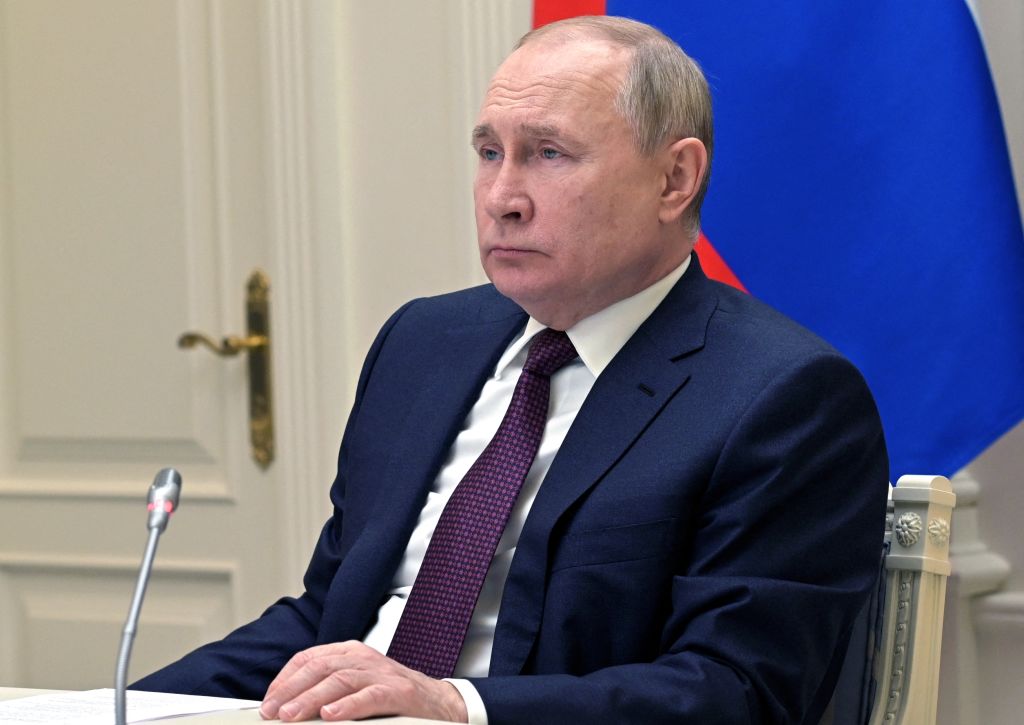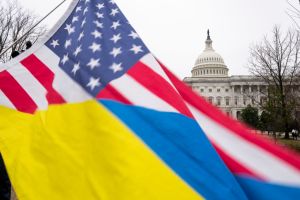Vladimir Putin’s war in Ukraine does not appear to be going well, and the Russian economy is about to experience the full force of Western sanctions. American social media is already in a celebratory mood.
But caution is in order — it’s never smart to underestimate your opponent. Putin was expecting sanctions, and he and his war planners could not have discounted Ukrainian resistance, even if they underestimated its intensity. Maybe they did expect the invasion to be a cakewalk and are taken aback by how difficult it’s proved to be in just these first few days. But as of now the invasion still seems to be on its timetable, and its military objectives are achievable.
Russians are surrounding Kyiv. They are moving through eastern Ukraine and up from the south about as quickly as their armor can move. Movement takes priority over battle for reasons that should be obvious. The Russians do not want to alienate the relatively pro-Russian population of the east by using more force than is strictly necessary. Encircling a city is the best way to encourage it to surrender without much of a fight. It’s also the best way to overpower the city if a fight can’t be avoided.
The early battles need only communicate to the Ukrainians that Russia is serious. Then when the full invasion force is in place, the defenders will be faced with a choice between easy acquiescence — perhaps even face-saving acquiescence, in light of the odds — or brutal Russian-style urban warfare. The more territory over which Russian forces freely move outside of the cities, the more isolated the cities will feel. Putin wants to give defenders a choice between surrender and a Masada-like last stand.
Seizing Ukraine’s capital (and government, if possible), along with securing the east and establishing a line of Russian control perhaps somewhat west of the Dnipro River, would give Putin the assets he needs for the next phase of his plan, the political counterattack. Putin enjoys judo — he hopes to turn his opponent’s strength, the relationship between Ukraine and the West, into leverage that he can use instead.
Consider the sanctions. Russia has already been hobbled by sanctions the West imposed following Putin’s annexation of Crimea in 2014. The West has refused to accept Crimea as a Russian possession, but Russia obviously is not going to give up control of the peninsula, despite the sanctions. The result, therefore, is a permanent regime of sanctions against Russia. What could Putin possibly do — if returning Crimea is inconceivable — to get those sanctions lifted? What could coerce the West into accepting Russian sovereignty over the peninsula?
Putin’s war in Ukraine is his answer. If the West loves Ukraine so much, then Ukraine will be Putin’s hostage. The West imposes more crippling sanctions, but that doesn’t change the logic behind Putin’s gamble — if anything, the greater stakes mean that Putin must be even more determined to succeed. He had no leverage over the West before; if he is ever going to have any, Ukraine must be his lever. (There are, to be sure, even more desperate throws he could attempt, involving nuclear weapons or an attack on NATO countries, but for now Ukraine is enough.)
The Russian endgame for the war itself plausibly works like this: take Ukraine hostage and get the Ukrainians themselves to implore the West to put everything on the table. In Putin’s ideal scenario, a captive and coerced Zelensky would be the best man to do the imploring; but if Zelensky proves too stubborn, someone else will be found. The settlement Putin demands will be a reversal of the latest sanctions, a reversal of the sanctions the West applied after the annexation of Crimea, Western recognition of Russia’s claim to Crimea, and Western and Ukrainian recognition of the puppet republics of Luhansk and Donetsk — all of that with a guarantee that Ukraine will never join NATO, too.
Would the West really consider such a ransom demand? What would Putin be willing to give up in practice — or what other hostage situations might he look to create? So far, China has not been as firmly in Putin’s camp as might be expected. But that might be a ploy on Xi Jinping’s part, saving his diplomatic capital for when it can be employed to maximum effect in the settlement phase. The West would have a very complicated global diplomatic problem on its hands, and even the slightest concession to Putin’s aggression might seem like complete surrender of moral principle. But if paying even a small ransom and paying a high one are equally morally contaminating, that may work to Putin’s advantage.
The invasion is an all-or-nothing bet for Russia. If the war really is going as badly as reports on social media suggest, and if Western sanctions hit Russia’s wider class of powerbrokers hard, perhaps Putin gets deposed. But if he doesn’t, his endgame stands a chance, or so he might think.
There is another, bigger endgame on Putin’s mind. By all accounts, the Russian president’s thoughts frequently turn to the fall of the Soviet Union. And the evidence written on his face, in the telltale signs of Botox treatment, suggests he is also haunted by the approach of his mortal end.
The Soviet Union’s last leaders before Gorbachev were famously decrepit. Putin, at sixty-nine, has already entered their demographic cohort. He is now the same age Yuri Andropov was when he died in office in 1984. Putin will be as old as Konstantin Chernenko ever lived to be — seventy-three — in a few years. Putin has already held office longer than Leonid Brezhnev, who was a living relic of a bygone age when he died at age seventy-five in 1982.
Joe Biden is much older than that; he turns eighty this year. And Ronald Reagan was already sixty-nine when he took office in 1981. But succession in a republic is much easier than in a communist oligarchy, where efforts to rejuvenate the leadership only hastened the downfall of the system. Putin’s system is not even an oligarchy. He is not, contrary to some journalists’ hyperbole, the only center of power in his country. Yet he is paramount to such a degree that he cannot simply retire and hand his role to anybody else. He has too many enemies and has amassed too much plunder that the next autocrat will want to claim as his own.
Russia has a constitution, one Putin has amended to his advantage. His term in office legally expires in 2024, but he can run again in 2030 if he wishes, by which time he will be a ripe seventy-seven. Russia is a difficult country for anyone to rule. Will Putin have the stamina to hold the reins at eighty? How many mistakes will his regime have built up by then, and how many opportunities will younger, stronger men find to think of deposing him?
The happiest scenario for Putin is that he dies in office, unchallenged but, like Brezhnev, at the end a front for the real exercise of power by a coterie. When he dies, the coterie will have to name a leader, if it can fend off ambitious outsiders or popular upheavals. This is the best-case scenario, but how good does Putin think it is in light of all he knows about the weakness of the dying Soviet Union and the stillborn Yeltsin regime?
Putin is not altogether crazy. If he’s growing more reckless, it’s because he knows he is running out of time to write his own ending. We might call this his “legacy,” but the word means more than a just presidential library for Putin. The legacy will mean a regime he made, or one he failed to make. It means a nation larger than the diminished one he inherited — or one still reduced to its post-Soviet minimum.
Putin has invaded his neighbors before, of course: Georgia in 2008, Crimea in 2014. The latter also has to be understood in terms of history’s horizons. Crimea is the home of Russia’s Black Sea Fleet, and any Russian leader — particularly one as conscious of his country’s decline as Putin is — is apt to see Crimea as a permanent national interest. But even if Putin’s Russia had been able to pressure Ukraine into not drawing any closer to the West in the short term, who was to say what might become of a Ukrainian-controlled Crimea in twenty or thirty years’ time?
Time was not on Russia’s side; if ever it was going to seize Crimea, why not as soon as possible? And why, Putin might have wondered, shouldn’t that be part of his legacy?
The same reasoning applies to the war Putin is waging now. Ukraine’s accession to NATO might not have been imminent, but nothing could be sure to prevent it in the future unless Putin prevented it at present.
And joining NATO is not the only way by which Ukraine could become Westernized to the point of posing an ideological threat to Russia. Putin would not have to reflect too deeply on Cold War history to conclude that the contrast in freedom and prosperity between East Germany and West Germany was an ever-present danger to East Germany’s existence. That was precisely why the Berlin Wall was built. And what if Russia’s closest cousins in Ukraine should become “West Germany” to Russia’s “East Germany”? That was not in prospect in the short term — Ukraine is poorer than Russia, for one thing — but times can change.
Putin knows the history. The West didn’t prevail in the Cold War because NATO invaded the Warsaw Pact or USSR. The risk to Putin’s regime-building ambitions is not that Ukraine joins NATO, and NATO then attacks Russia. It’s rather that Ukraine’s integration into the European Union or NATO, or even a less formally institutionalized integration into the West, would establish a plausible alternative regime right on Russia’s doorstep. The Baltic Republics and Finland are not populous enough to exert a strong pull within Russia. Ukraine is another matter.
The Soviet empire was destroyed by a chain reaction: the Warsaw Pact members bordering the West revolted from Moscow’s control in 1989; Ukraine seceded from the USSR in 1991; and Russians naturally wondered why they should be the last people left to live under the Communist yoke. But if there had been a no-man’s land between the West and Soviet Union, maybe the chain reaction could have been slowed enough to be stopped at home by force. The Soviet Union might have bought itself some time, perhaps time enough for a leader like Putin to arise.
Vladimir Putin’s endgame, the final act of his career, is not just about territory (as important as that certainly is to him), but about preserving the character of Russia as he envisions it — his Russia, not an appendage of the West, not Yeltsin’s sorry country, but the Russia that Putin identifies with in history and has tried to create anew in the present, even as he enriched himself at the expense of its people. The tyrants of the Renaissance were a kind of artist, with men’s lives as their medium. Putin aspires to be a Michelangelo. But even if he doesn’t lose everything in this war he’s started, Putin is no more a genius than Brezhnev was. Russia’s destiny is out of Putin’s control, and so is Ukraine’s — though its land and its people, like Russia’s, suffer from his violence.


















